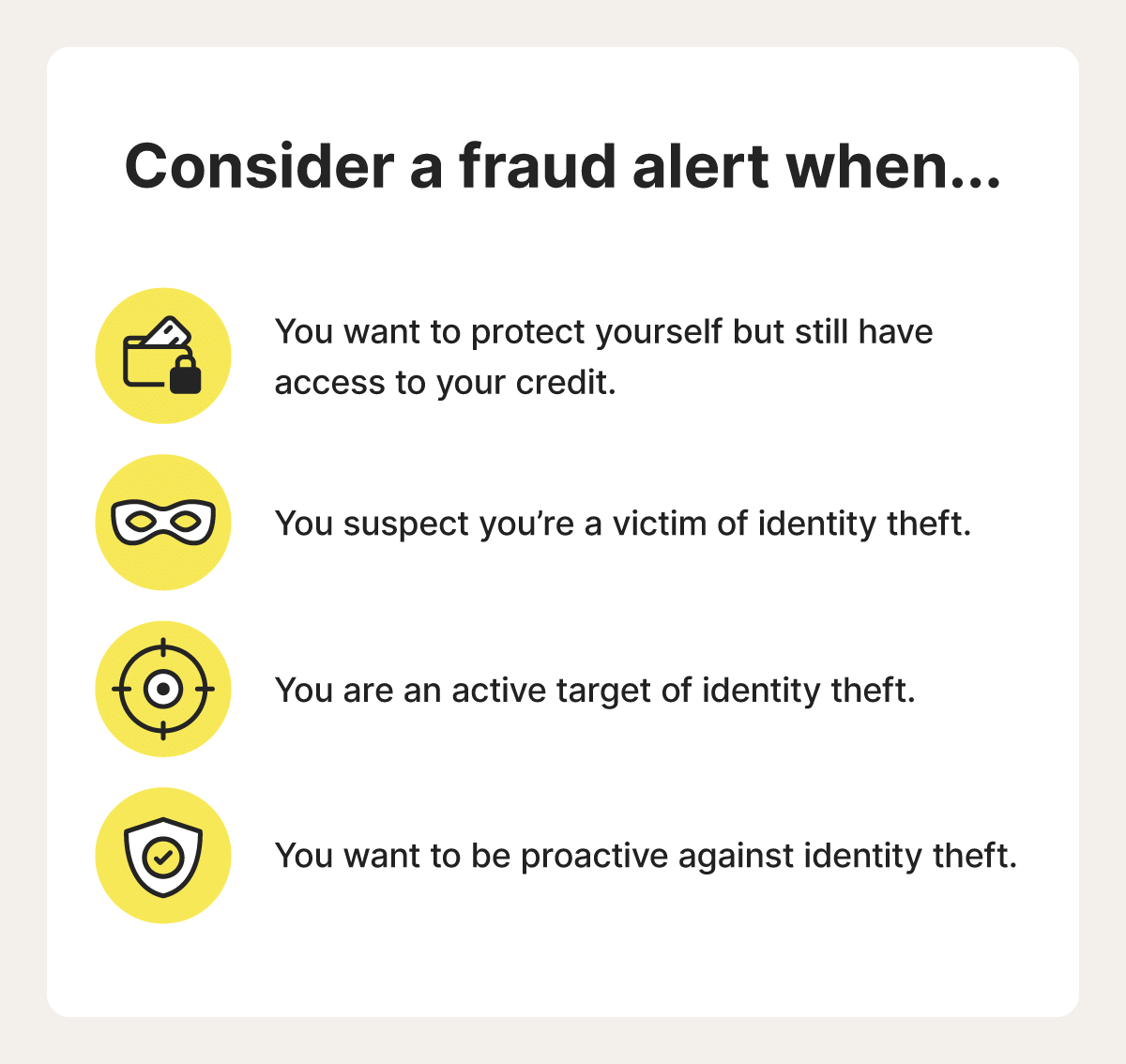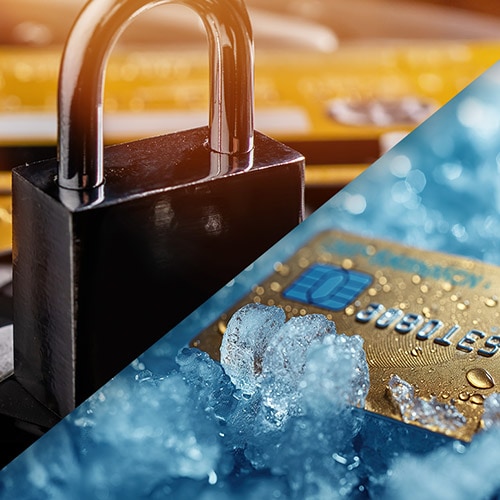Falling victim to fraud can cause all sorts of damage, including destroying your credit score and making it harder for you to get credit in the future. Fortunately, you can take action to help protect yourself with tools like fraud alerts and credit freezes.
A fraud alert warns creditors to verify your identity before issuing credit. A credit freeze blocks access to your credit report altogether, making it harder for identity thieves to open accounts in your name.
This guide to fraud alerts vs. credit freezes will help you decide which method of credit fraud protection is best for your situation.
What is a fraud alert?
A fraud alert is a free notice you can add to your credit report that informs creditors you may be a victim of fraud. It prompts them to take extra steps to verify your identity before approving new credit, adding a layer of protection to help prevent unauthorized credit applications.
There are three types of fraud alerts:
- Initial fraud alert: This temporary alert lasts for one year. You can add it for any reason and renew it as needed.
- Extended fraud alert: This type of fraud alert provides seven years of protection for confirmed victims of identity theft.
- Active-duty military alert: This alert is intended for deployed service members and lasts for one year unless it’s removed sooner.
When a fraud alert is in place, creditors may contact you directly or ask for additional documents, like a government-issued ID, to be submitted as part of the credit application process.
When should you set up a fraud alert?
A fraud alert is a great alternative to a credit freeze if you’re actively applying for a credit card, loan, or mortgage but still want a layer of protection against credit fraud.
It won’t prevent you from making credit applications, but acts as a barrier that helps stop identity thieves using your details fraudulently.
Here are additional reasons to consider setting up a fraud alert:
- You suspect potential identity theft: If your personal information has been compromised in a data breach or leak, you’ve lost your wallet, or you’re otherwise worried your identity has been stolen, an initial fraud alert can add a layer of security to your credit file.
- You are a victim of identity theft: If you know that your identity has been stolen and you’re taking steps to protect yourself against subsequent fraud, an extended fraud alert can help stop the fraudsters from opening accounts in your name.
- You want proactive credit fraud protection: You can place an initial fraud alert, regardless of whether you’re concerned your identity has been stolen, for proactive protection against unauthorized credit applications.


How to set up a fraud alert
You'll need to contact one of the three major credit bureaus — Equifax, Experian, and TransUnion — to place a fraud alert. The bureau you contact is required to notify the other two bureaus to place alerts on their files, too. You can contact them online, by phone, or through the mail.
To place an alert, you’ll likely need to provide these documents:
- A state-issued ID
- Proof of address
- An official identity theft report (for extended fraud alerts)
What is a credit freeze?
A credit freeze, also known as a security freeze, restricts creditors from accessing your credit report. Since lenders and credit card issuers require access to your credit history before approving applications, a freeze prevents fraudsters from opening new accounts in your name, reducing the risk of credit fraud.
Credit freezes also prevent you from opening new lines of credit. So, if you want to apply for a new credit card, for example, you’ll need to unfreeze your credit to allow the inquiry to complete, then refreeze it again if you want to keep restricting access.
When should you freeze your credit?
If you don’t anticipate needing access to new credit soon, you can freeze your credit as a proactive step to help safeguard your financial well-being. Additionally, if you suspect your personal information has been compromised, a credit freeze can help protect you from subsequent fraud.
These are some of the key reasons to consider freezing your credit:
- Lost or stolen wallet: Your wallet likely contains lots of sensitive items, like your credit cards, ID, and maybe even your Social Security card. If a lost wallet falls into an identity thief’s hands, they’ll have details they need to open fraudulent accounts in your name. A credit freeze can help block this from happening.
- Data breach: Data breaches can expose personal information like your Social Security number, financial records, or passwords to cybercriminals. Freezing your credit can mitigate the risk of this data being used by cybercriminals to commit credit fraud.
- Phishing scams: If you've inadvertently shared personal or financial details with a phishing fraudster, freezing your credit can help prevent them from using the information you provided to open new credit accounts.
- Mail theft: Sensitive mail — like credit card statements, pre-approved credit offers, or medical bills — being stolen puts you at risk of fraud. By freezing your credit, you can prevent fraudsters from using the information on these documents to apply for credit in your name.
- Public Wi-Fi use: Public Wi-Fi networks are often unsecured, making it easier for hackers to intercept sensitive information like your passwords or financial details. If you suspect your data may have been exposed, freezing your credit adds a layer of protection against potential misuse in a credit fraud scheme.
How to freeze your credit
To freeze your credit, you have to contact each of the three major credit bureaus individually. You can complete this simple process online, over the phone, or by mail, with the online option generally providing the quickest route to a credit freeze.
Credit freeze contact information
You’ll need to provide each bureau with the following personal information to process your request:
- Full name
- Address
- Date of birth
- Social Security number
- Government-issued identification
Remember, since different creditors may use different bureaus for credit reports, freezing your credit at all three bureaus is important to maximize your protection.
You can unfreeze your credit temporarily or permanently depending on your needs. A temporary “thaw” allows you to set a start and end date, ensuring your credit report is only accessible for a specific period. Permanently unfreezing your credit removes the freeze entirely until you choose to reactivate it.
You can initiate the process online, by phone, or by mail, with online or phone requests typically processed within an hour and mail requests within three business days.
Keeping your credit frozen at each bureau as standard can keep you better protected against credit fraud. However, you'll need to thaw or remove the freeze before applying for new credit, like a loan or credit card, to ensure potential creditors can access your report.
Fraud alert vs. credit freeze: Which should you use?
While both fraud alerts and credit freezes can help protect you from credit fraud following identity theft, they work differently. Here’s a head-to-head comparison to help you decide which one is right for you:
Fraud alert vs. credit freeze
| Fraud alert | Credit freeze | |
|---|---|---|
What it does
|
Notifies creditors to verify your identity before approving new credit
|
Restricts creditors from accessing your credit report without permission
|
When to use it
|
If you suspect identity theft or want protection while still making credit applications
|
To protect against fraud if you don’t plan to apply for credit soon
|
Pros
|
Credit approvals require identity verification
|
Prevents unauthorized access to your credit report
|
You can still apply for new credit
|
Strong protection against identity theft and fraud
|
|
Less disruptive than a credit freeze
|
Lasts indefinitely but can be thawed when needed
|
|
Cons
|
Expires automatically and requires manual renewal
|
Requires unfreezing to apply for new credit |
Not as effective at preventing fraud as a credit freeze
|
||
Duration
|
1 year for initial or active-duty fraud alerts; 7 years for extended alerts
|
Indefinite
|
Can it be renewed?
|
Yes
|
Yes
|
Cost
|
Free
|
Free
|
Can a fraud alert or credit freeze hurt your credit score?
A credit freeze or fraud alert won’t hurt your credit score. Both options only control or limit access to your credit report and don’t impact your credit history or the factors used to calculate your score. However, they can help protect your credit score from the potential negative effects of credit fraud by preventing unauthorized accounts from being opened in your name.
Monitor your credit to protect against fraud
Credit freezes and fraud alerts are both effective tools that can help protect you against the worst consequences of credit fraud. Use LifeLock for added protection, with active credit monitoring providing automatic alerts of suspicious activity on your credit file.
With additional features including Social Security number fraud alerts and access to U.S.-based identity restoration specialists, LifeLock allows you to stay ahead of the potential risks of identity theft and take quick action to protect your identity if necessary.
FAQs
Is a fraud alert the same as a credit freeze?
No, a fraud alert is not the same as a credit freeze. A fraud alert notifies creditors to verify your identity before approving credit, while a credit freeze restricts access to your credit report entirely, preventing new credit from being issued without your authorization.
Can you have a credit freeze and fraud alert at the same time?
Yes, you can have both a credit freeze and a fraud alert at the same time. A credit freeze blocks access to your credit report, while a fraud alert notifies creditors to verify your identity before opening new accounts. Using both provides an added layer of security against credit fraud.
Can I still get credit with a fraud alert?
Yes, you can still get credit with a fraud alert. A fraud alert doesn’t block access to your credit report; it simply requires creditors to verify your identity before approving any new accounts.
How can I check if my credit is frozen?
You can check if your credit is frozen at each of the three major credit bureaus online or by phone. A credit freeze will also appear on your credit report.
Editor’s note: Our articles provide educational information. LifeLock offerings may not cover or protect against every type of crime, fraud, or threat we write about.
Start your protection,
enroll in minutes.
LifeLock is part of Gen – a global company with a family of trusted brands.
Copyright © 2026 Gen Digital Inc. All rights reserved. Gen trademarks or registered trademarks are property of Gen Digital Inc. or its affiliates. Firefox is a trademark of Mozilla Foundation. Android, Google Chrome, Google Play and the Google Play logo are trademarks of Google, LLC. Mac, iPhone, iPad, Apple and the Apple logo are trademarks of Apple Inc., registered in the U.S. and other countries. App Store is a service mark of Apple Inc. Alexa and all related logos are trademarks of Amazon.com, Inc. or its affiliates. Microsoft and the Window logo are trademarks of Microsoft Corporation in the U.S. and other countries. The Android robot is reproduced or modified from work created and shared by Google and used according to terms described in the Creative Commons 3.0 Attribution License. Other names may be trademarks of their respective owners.







